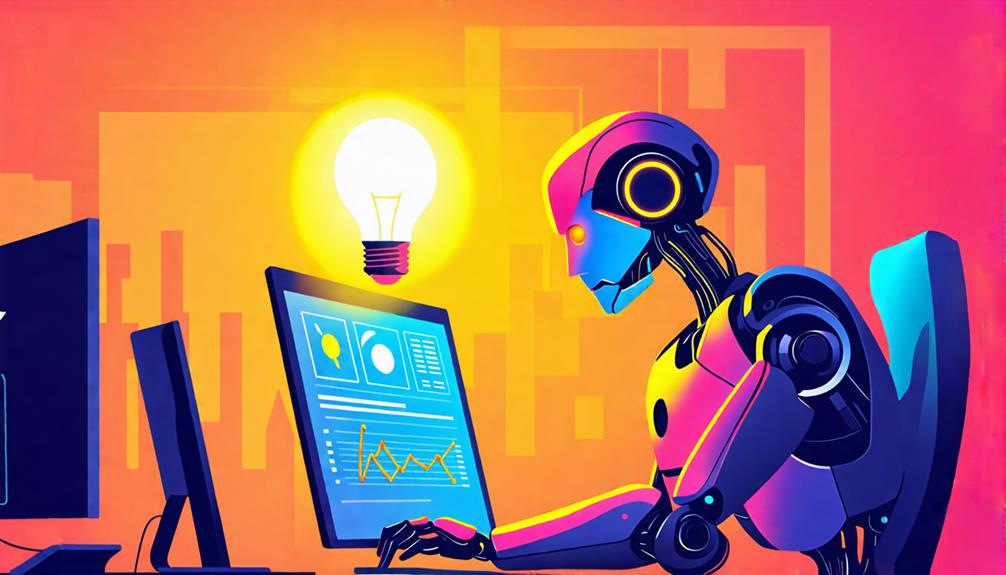
In several areas, you'll find AI technologies that outperform Google's capabilities. For instance, IBM's Watson leads in healthcare with its advanced diagnostics, especially in early-stage cancer detection. Similarly, OpenAI's GPT-3 surpasses Google in generating contextually relevant text, making it an excellent tool for content creators. Additionally, Tesla's Autopilot showcases superior real-time decision-making compared to Google's Waymo. These examples highlight that while Google's AI is robust, competitors like IBM, OpenAI, and Tesla are excelling in specific fields. Exploring further, you'll uncover more about how these innovative AI technologies are paving the way forward.
Overview of Google's AI Capabilities

Google's AI capabilities encompass a wide range of advanced technologies, including natural language processing, machine learning, and autonomous decision-making. You've likely interacted with some of these technologies without even realizing it. From Google Assistant, which simplifies tasks through voice commands, to Google Translate's near-instantaneous language conversion, these tools are part of your daily digital experience.
Moreover, Google's AI extends into more complex arenas. Consider DeepMind, their AI research lab, which solves problems that even experts in the field find daunting. Its achievements include developing AlphaFold, which predicts protein structures with incredible accuracy, revolutionizing biochemistry.
You'll also find Google's AI behind the scenes in their search algorithms. These systems predict what you're looking for, often before you finish typing your query. It's not just about understanding words; it's about anticipating needs based on patterns in vast amounts of data.
These technologies are constantly evolving, driven by an ongoing quest to make them more efficient, accessible, and effective. Whether you're getting directions, searching for news, or translating a foreign language, Google's AI is enhancing your interactions, making complex tasks seem simple and intuitive.
Leading Competitors in AI Technology
While Google remains a giant in AI, other companies like IBM, Microsoft, and OpenAI also lead with innovative technologies that challenge the status quo.
You've probably heard of IBM's Watson, which famously won 'Jeopardy!' and now dives deep into healthcare, helping doctors diagnose diseases faster than ever.
Then there's Microsoft, leveraging its AI to enhance cloud computing and offering tools that not only boost productivity but also advance personal computing experiences.
Don't overlook OpenAI, a relatively new player that's been turning heads with its groundbreaking approaches. They've become a powerhouse, especially in natural language processing. Their models aren't just academic; they're practical, integrated into products you might use daily without even realizing it.
You should also keep an eye on companies like Amazon and Facebook, both of which are integrating AI into their vast networks to improve user experience and streamline operations. Amazon's Alexa and Facebook's AI research continually push the boundaries of what AI can do in both commerce and social interaction.
These competitors are relentlessly innovating, ensuring that they stay in the race. It's clear they're not just following in Google's footsteps; they're paving their own paths. This makes the AI landscape not only more competitive but also more diverse and dynamic.
Key Features of Advanced AI Systems

Advanced AI systems boast several key features that significantly enhance their functionality and user interaction. You'll find that these systems are equipped with superior natural language processing (NLP) capabilities. This means they can understand and generate human-like text, making your interaction with them much more intuitive and less robotic.
They also leverage deep learning algorithms that adapt and improve over time based on the data they process. It's like they're learning right alongside you, getting better at predicting your needs and preferences.
Moreover, advanced AI platforms often include automated reasoning tools. These tools help the AI to make decisions based on complex, multi-step logic, almost like a seasoned chess player plotting several moves ahead. It's not just about raw data processing; it's about making smart, informed decisions.
You'll also appreciate their ability to integrate with multiple data sources seamlessly. Whether it's pulling information from the cloud, accessing proprietary databases, or syncing with IoT devices, these AIs handle it all effortlessly. This integration capacity ensures that you have a holistic view and the AI has all the context it needs to serve you effectively.
Case Studies: AI Outperforming Google
Now let's explore real-world instances where AI has surpassed Google in performance. One notable example is in the field of medical diagnostics. IBM's Watson Health demonstrated remarkable capabilities by outperforming Google's diagnostic algorithms in detecting early-stage cancer. Watson's ability to integrate and analyze vast amounts of medical literature and patient data enabled it to identify subtle patterns that were often missed by traditional methods.
In another instance, OpenAI's GPT-3 showcased superiority over Google's search algorithms in creating content that's not only informative but contextually relevant, often providing insights that are more nuanced and tailored to user inquiries. This AI's understanding of complex language nuances and its ability to generate human-like text has made it a preferred tool for tasks where depth and creativity are crucial.
Lastly, in the realm of autonomous vehicles, Tesla's Autopilot system has demonstrated instances of better real-time decision-making compared to Google's Waymo. By processing real-time data from the vehicle's sensors and cameras, Tesla's AI can make split-second decisions that enhance safety and driving efficiency, showcasing a practical edge in everyday vehicle operation.
Future Trends in Artificial Intelligence

Looking ahead, you'll see AI continue to evolve, impacting various sectors with increasingly sophisticated applications. You'll witness transformative changes in healthcare, where AI-driven diagnostics and personalized treatment plans become the norm. This isn't just about faster data processing; it's about AI systems that can predict diseases before they manifest, saving countless lives.
In the realm of business, AI's influence will streamline operations like never before. You'll see smart systems optimize supply chains, predict market trends, and automate customer service, making businesses more efficient and responsive. This means you can expect a surge in productivity and a significant reduction in operational costs.
Education will also see a revolution. AI tutors will provide personalized learning experiences, adapting to each student's pace and style of learning. This isn't a distant dream—it's an imminent reality. These AI systems will identify gaps in knowledge and tailor content accordingly, ensuring no student is left behind.
For you, as a consumer, AI advancements will translate into smarter homes and more intuitive interfaces. Your home won't just respond to your commands but anticipate your needs. From energy management to entertainment, AI will make your daily life smoother and more enjoyable.
Frequently Asked Questions
How Do AI Systems Impact Job Opportunities in Traditional Sectors?
AI systems are reshaping job opportunities in traditional sectors by automating routine tasks. You'll see new roles emerge that require tech skills, while some older roles may become less necessary.
What Ethical Concerns Arise With the Use of Advanced Ai?
You might worry about privacy, bias, and control when considering advanced AI. These ethical concerns highlight the need for strict regulations to ensure AI's impact aligns with societal values and rights.
How Does AI Technology Affect Data Privacy for Individuals?
AI technology can compromise your data privacy by collecting and analyzing vast amounts of personal information, often without explicit consent. This raises significant concerns about unauthorized access and misuse of your private data.
Can AI Systems Develop or Exhibit Creativity?
You're wondering if AI systems can exhibit creativity. Yes, they can develop creative outputs by analyzing vast data sets and identifying patterns that might not be obvious to the human eye.
What Regulatory Measures Are in Place for AI Technology?
You're asking about AI regulations. Various governments have established guidelines to ensure safety, privacy, and ethical usage. These include data protection laws, AI transparency requirements, and specific standards for autonomous vehicles and healthcare applications.
Conclusion
You've seen how Google's AI stacks up against its rivals. From enhanced learning algorithms to innovative user interfaces, competitors are stepping up.
Take note of those AI systems that excel in specific tasks where Google might lag behind. As you look ahead, the AI landscape is rapidly evolving.
Keep an eye on emerging technologies and the continuous advancements that promise to redefine what AI can do. The future is bright, and the competition fierce—stay curious and informed!






